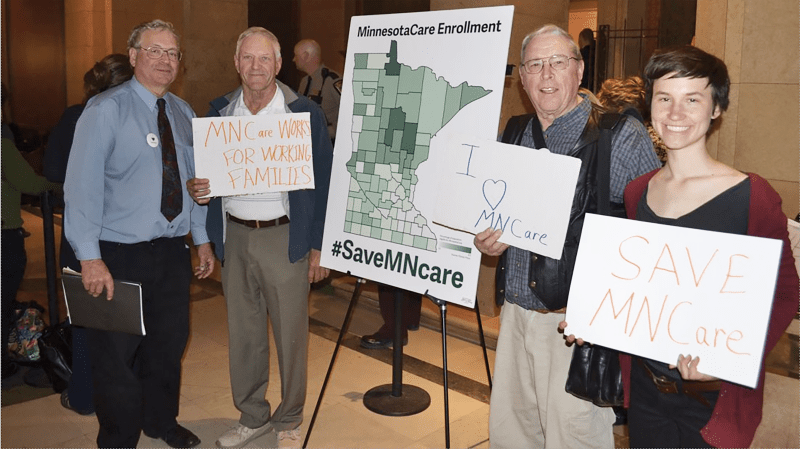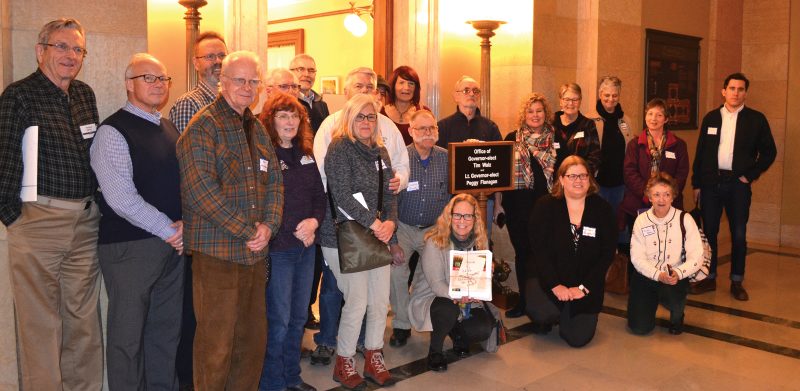The Land Stewardship Project began organizing around healthcare in 2008 after hearing over and over again from our members that one of the primary barriers to getting into farming, or staying in it, is lack of access to affordable and useful health insurance. Farmers and other self-employed people do not have employer-based healthcare coverage without off-the-farm or additional jobs. They also often have variable incomes, making it difficult to consistently qualify for programs like MinnesotaCare. Moreover, having insurance doesn’t necessarily mean care is affordable, accessible, or of high-quality. People often have to delay or skip necessary medical care because they can’t afford the high out-of-pocket expenses if coverage is denied or they have high deductibles or co-payments. In rural areas in particular, it is hard to find in-network services when and where they are needed.
After years of grassroots organizing for accessible, affordable, high-quality healthcare for all Minnesotans, regardless of income, age, zip code, or  immigration status, LSP celebrates two strong steps in the right direction during the recently adjourned session of the state Legislature with the passage of a MinnesotaCare Public Option and the Prescription Drug Affordability Board.
immigration status, LSP celebrates two strong steps in the right direction during the recently adjourned session of the state Legislature with the passage of a MinnesotaCare Public Option and the Prescription Drug Affordability Board.
Originally called the MinnesotaCare Buy-In, the Public Option expands access to affordable health coverage for more Minnesotans by allowing those
without access to employer-based coverage the option of purchasing a plan from this well-tested public program, paying an affordable premium based on their income. Currently, MinnesotaCare is only available to working Minnesotans with an income below 200% of the federal poverty line or $55,000 per year for a family of four. This leaves many no other option but to buy insurance on the individual health insurance market, which is plagued by ever-rising deductibles and out of pocket maximums of as much as $7,000 to $20,000 a year.
Another key aspect of expanding MinnesotaCare this session was ending the ban on coverage for Minnesotans without citizen status. Currently, thousands of undocumented workers and families, many on the frontlines of our food and farming system, are left without healthcare when they need it most. The Minnesota Department of Health Services estimates that 300,000 Minnesotans are uninsured. A disproportionate number of uninsured Minnesotans are Black, Indigenous, and/or people of color and 17% are undocumented immigrants. As an organization committed to transforming the food and farming system, we have consistently advocated for a healthcare system that leaves no one behind.
Over $1 billion on the reinsurance program has not fixed the problems of Minnesota’s individual health insurance market or expanded coverage. Instead of continuing to spend enormous resources subsidizing a broken health insurance system, Minnesota can now direct our healthcare dollars toward a better quality, affordable public health insurance option. The MinnesotaCare Public Option will be paid for with state and federal funds, premiums, and cost-sharing. Now that the MinnesotaCare Public Option has passed, agencies can begin conducting an actuarial analysis to determine how many Minnesotans are likely to enroll, and determine the premium costs based on that information. Minnesota’s Department of Health Services will also start the process of applying for the federal waiver to redirect federal healthcare dollars to the public option.
The Prescription Drug Affordability Board (PDAB) will have the power to rein in skyrocketing medication prices that Minnesotans rely on to survive and thrive by carefully setting upper payment limits on high-cost drugs. For too long, pharmaceutical corporations have legally been allowed to price-gouge when it comes to medicine, driving up costs at the pharmacy and across our entire healthcare system. Our current system works well for the industry’s profit-generating stakeholders, but it’s certainly not working well for patients. Even if you aren’t on a high-cost drug, we all pay the price for drug companies’ greed through higher costs for premiums, deductibles, and other out-of-pocket costs. In the words of Minnesota Attorney General Keith Ellison, who was a strong advocate for this legislation, “No one should have to choose between affording their medications and affording to live.”
For 15 years, LSP member-leaders have worked to get the MinnesotaCare Public Option with immigrant inclusion and Prescription Drug Affordability Board across the finish line by:
- Holding hundreds of constituent meetings with state legislators at LSP Family Farm Breakfasts, in-district meetings and events, coalition lobby days, and more.
- Sharing our stories in dozens of legislative hearings and at rallies.
- Publishing dozens of letters-to-the-editor in newspapers across the state.
- Holding several Town Hall meetings with Attorney General Ellison and other key leaders.
- Gathering thousands of petition signatures calling on state leaders to champion affordable, accessible, high-quality healthcare solutions.
- Sending thousands of e-mails and making countless calls to our lawmakers, urging them to support the MinnesotaCare Public Option, and the Prescription Drug Affordability Board and Provider Tax, as well as oppose reinsurance and other false solutions.
- And more. In the end, people power prevailed!
Expanded access to MinnesotaCare will help make lives more sustainable, reliable, and affordable for farmers and others without access to employer-based coverage in communities across our state, as well as young people who age off their parents’ insurance, and early retirees. This expanded public program will make Minnesota a place where culture, innovation, small businesses, and local economies can thrive and grow.
These wins are great encouragement for the road ahead. Healthcare legislation and its implementation are complicated and there are many pieces to the complex puzzle. Undocumented workers should be able to start buying into the current MinnesotaCare program by 2025 and the MinnesotaCare Public Option should be rolling out in 2027. This means, of course, that there’s more work to be done by people’s organizations like LSP and our partners at Minnesota Farmers Union, TakeAction, SEIU, UNIDOS, Minnesota Nurses Association, AARP, Springboard for the Arts, Mainstreet Alliance, ISAIAH, AFL-CIO, MN Budget Project, and others to ensure everyone has the healthcare they need.
Give it a Listen
In episode 310 of LSP’s Ear to the Ground podcast, we discuss why working on healthcare reform is so important and provide more details on what was accomplished during the 2023 session of the Minnesota Legislature.
Paula Williams is a long-time LSP member-leader from Barnum, Minn., who recently led LSP’s healthcare organizing work in a short-term staff role. As her role as an LSP staff member has come to an end, she will be re-joining the LSP board of directors. For more information on LSP’s healthcare work, contact policy manager Amanda Koehler at akoehler@landstewardshipproject.org or 612-400-6355.
